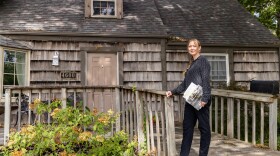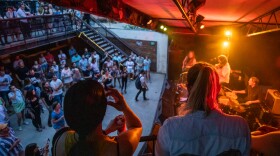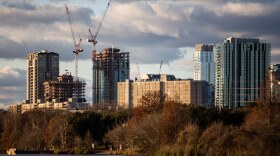Update: Austin City Council gave initial approval to parts of the plan and was split over whether to limit the size of the proposed music venue. Ultimately, the majority of the council voted to keep the venue size open to discussion. The case requires another vote to finalize.
Mayor Steve Adler cautioned the project’s supporters to not get ahead of themselves; because of a legal challenge from neighbors, the zoning changes require more than a majority of council support to pass.
"I don’t want anybody to get too excited either way on this,” he said. “You guys need nine votes in order to get this passed, so there’s work ahead of you.”
Our original story follows:
Included in a plan to develop nearly 5 acres of land just east of South Congress Avenue is a proposal to revive a former music venue with a legendary past.
The idea to revive the Austin Opera House requires a zoning change and therefore a vote in favor from the Austin City Council. But neighbors have filed a legal challenge that could halt the project.
“We’re trying to do something good for the city and yet we’re met with a lot of resistance," developer Chris Wallin, who bought the property in 2012, told KUT. "I’m just not quite sure how you get something like this done."
Wallin, along with musician and architect Richard Weiss, have proposed restoring portions of the old music venue to create a space that could hold roughly 1,200 concertgoers. They are also hoping to build up to 200 housing units, 8,000-square feet of retail space and an Austin music museum. Some of the apartments, Wallin said, could be built through a city housing program and made affordable for local musicians.
“We worked together to try to come up with some type of project that could help preserve some of our past and history and provide some benefits to the music community and also create new housing,” Wallin said.
According to Weiss, the building opened as the Texas Opry House in 1974. Two years later, musician Willie Nelson bought it and renamed it the Austin Opry House and then eventually the Austin Opera House. The 42,000-square foot venue hosted artists Etta James, B.B. King and U2.
“It was inclusive of every genre of music and every kind of artist,” Weiss said.
The venue shut down in the 1990s and was eventually converted into offices and a music studio.
In 1986, Austin City Council members had adopted new zoning rules for the neighborhood that included the Austin Opera House. Referred to as Neighborhood Conservation Combining Districts, or NCCDs, these rules are applied to existing land use rules in Austin neighborhoods. The new NCCD adopted for this part of South Austin capped development; it lowered maximum building heights, density and the amount of land buildings could cover.
It also prohibited live music.
That's one reason, Weiss said, project backers are asking Austin City Council members to exempt the site from the NCCD.
But neighbors have voiced myriad concerns, including increased traffic, noise and alcohol sales.
“Bring on the development, bring us public transportation, housing, local markets, but PLEASE do not bring the same thing in that has proven time and again to be disruptive within the confines of a lovely, yet ever evolving historic neighborhood,” members of the Greater South River City Neighborhood Contact Team wrote to the city.
Neighbors have gathered enough signatures from nearby property owners to require a supermajority vote for a zoning change to pass; in Austin’s case, that means nine of the 11 council members must sign off.
“You have patrons [who will] basically arrive at one time and leave at one time,” Laura Toups, part of the Greater South River City Neighborhood Contact Team, told members of Austin’s Planning Commission at a meeting last October. “That time is not 5 o’clock or 8 o’clock, when you leave a nice restaurant. That’s midnight. That’s 2 a.m. and that has a tremendous effect on a neighborhood.”


















